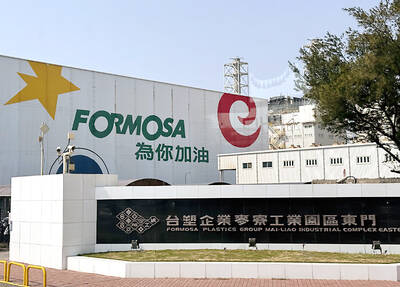Taiwan Power Co (Taipower, 台電) registered accumulated deficits of NT$83.2 billion (US$2.59 billion) in the first eight months of this year, while petroleum refiner CPC Corp, Taiwan (CPC, 台灣中油) incurred deficits of NT$59.1 billion, statistics released on Saturday by the Ministry of Economic Affairs (MOEA) showed.
Ministry officials estimated that the deficits of the two state-run companies would expand further by the end of the year because of cost increases in raw material such as coal and crude oil.
The companies have not increased their prices to levels that truly reflect surging costs, constrained by the government’s policy of maintaining stability in consumer prices, the ministry said.
Taipower has estimated that it will be faced with a deficit of up to NT$100 billion this year.
Although electricity prices were raised on July 1 and again last Wednesday under the Executive Yuan’s two-phase adjustment policy, the scale of the adjustments have been enough to cover only half the company’s cost increases, officials said.
Statistics show that all MOEA-owned enterprises, except Taipower and CPC, generated profits this year as of Aug. 31, including profits of NT$14.79 billion at Taiwan Sugar Corp (台糖), NT$422 million at Taiwan Water Corp (台灣自來水), NT$2.02 billion for the shipbuilder CSBC Corp, Taiwan (台灣國際造船) and NT$54 million at Aerospace Industrial Development Corp (漢翔).

EXTRATERRITORIAL REACH: China extended its legal jurisdiction to ban some dual-use goods of Chinese origin from being sold to the US, even by third countries Beijing has set out to extend its domestic laws across international borders with a ban on selling some goods to the US that applies to companies both inside and outside China. The new export control rules are China’s first attempt to replicate the extraterritorial reach of US and European sanctions by covering Chinese products or goods with Chinese parts in them. In an announcement this week, China declared it is banning the sale of dual-use items to the US military and also the export to the US of materials such as gallium and germanium. Companies and people overseas would be subject to

Taiwan Semiconductor Manufacturing Co (TSMC, 台積電) founder Morris Chang (張忠謀) yesterday said that Intel Corp would find itself in the same predicament as it did four years ago if its board does not come up with a core business strategy. Chang made the remarks in response to reporters’ questions about the ailing US chipmaker, once an archrival of TSMC, during a news conference in Taipei for the launch of the second volume of his autobiography. Intel unexpectedly announced the immediate retirement of former chief executive officer Pat Gelsinger last week, ending his nearly four-year tenure and ending his attempts to revive the

WORLD DOMINATION: TSMC’s lead over second-placed Samsung has grown as the latter faces increased Chinese competition and the end of clients’ product life cycles Taiwan Semiconductor Manufacturing Co (TSMC, 台積電) retained the No. 1 title in the global pure-play wafer foundry business in the third quarter of this year, seeing its market share growing to 64.9 percent to leave South Korea’s Samsung Electronics Co, the No. 2 supplier, further behind, Taipei-based TrendForce Corp (集邦科技) said in a report. TSMC posted US$23.53 billion in sales in the July-September period, up 13.0 percent from a quarter earlier, which boosted its market share to 64.9 percent, up from 62.3 percent in the second quarter, the report issued on Monday last week showed. TSMC benefited from the debut of flagship

TENSE TIMES: Formosa Plastics sees uncertainty surrounding the incoming Trump administration in the US, geopolitical tensions and China’s faltering economy Formosa Plastics Group (台塑集團), Taiwan’s largest industrial conglomerate, yesterday posted overall revenue of NT$118.61 billion (US$3.66 billion) for last month, marking a 7.2 percent rise from October, but a 2.5 percent fall from one year earlier. The group has mixed views about its business outlook for the current quarter and beyond, as uncertainty builds over the US power transition and geopolitical tensions. Formosa Plastics Corp (台灣塑膠), a vertically integrated supplier of plastic resins and petrochemicals, reported a monthly uptick of 15.3 percent in its revenue to NT$18.15 billion, as Typhoon Kong-rey postponed partial shipments slated for October and last month, it said. The